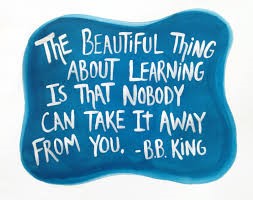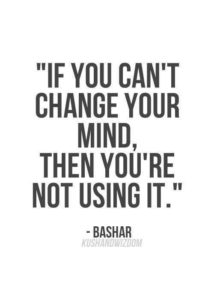Belonging is a two way street. There must be mutual acceptance; you must accept the group and the group must accept you. We all belong to groups of some sort or another. Groups like, families, friends, co-workers, religion, political party, knitting clubs, disease associations, professional associations, team supporter, and on and on goes the list. The desire to belong is in the nature of being human. It is important to be part of something bigger than we are. Acceptance into a group is great but rejection can be devastating.

As we progress in life, learning new things, meeting new people, having different interests, we can outgrow a group. That is the way of life. Changing jobs is an excellent example. The good news is as you move on through life, there are other groups who share your new interests.
The problem is you may feel you need to keep your interests and knowledge a secret because you do not want to lose your acceptance by the group. Maybe a worse problem is choosing not to grow new interests or learn new things due to fear of losing acceptance by the group. Which leads to the topic of this post. The importance of both personal development and belonging in a new group. So here we go, the topic for this post is; you are who you are until you are not, then what?
At the end of this paragraph, I am going to ask you to learn something new. The wonderful thing about living in a connected world is that information on most any topic is readily available. If you want to know something, looking it up is an easy thing to do. So think of a topic you want to know more about. Pick something you do not know a lot about already. Search for your topic in Wikipedia. There are over 5 million articles in the English version of Wikipedia so chances of finding your topic is good. If you do not want to pick a topic, look at the fifth link in the left-hand column in Wikipedia and click “Random article”. Once you found an article, take a few minutes and read all or a part. Then please come back to this post.

Assuming you are back having read about some topic, you have just engaged in a personal development activity. You have new information or came to a new understanding of information you already knew. You could also look something up in a search engine like Google or Bing. (Yes I did look up search engines in Wikipedia to see which two were the most popular.) You can search for the definition of words you did not understand. You can see videos, pictures and charts.
Just about any information you could want is online. There are many places online to get information and a lot of information to get. You can take online courses; you can join discussions on about any topic you can imagine. The information is available to you and many different formats at any time you want it. Virtually anyone who is online, anywhere in the world, also has access to the information. Rich or poor, educated at a fancy university or self-taught, rural, urban, of any religion, of any gender, you get the idea. Access to information is no longer an excuse for not engaging in personal development.
I am about to teach you a secret about looking stuff up that really is not much of a secret, but can be life changing.
- When you look something up, find more than one source of information. Get more than one perspective on the topic. Polar bears can be cute in a kid’s book, but another source will point out that they also will eat their young if they are hungry enough. My personal rule of thumb is three sources to understand and 5 – 10 sources if I want to understand the topic enough to stand up in a meeting to talk about it.
- Look up related topics to the topic that are not the topic. Sure, read about online marketing for the job you hope to get one day. Also, read about Guerrilla marketing or word of mouth marketing. Compare and contrast. What works best for which situation? Get perspective on what you want to know about.

Knowing how to interview might help you get the new job, but having knowledge and perspective on what you need to know to do the new job will help more. Personal development is not just about getting a new job. It is about having an informed opinion rather than just repeating someone else’s talking points. It is about knowing how to cook from raw ingredients rather than a box. It is about being a more interesting person.
However, it is time to get to the point. Most groups are groups because the members share similar points of view. Getting perspective on a topic can change your point of view. It is possible that if the group learns that you no longer are at their level of understanding, they will reject you. However, it is more likely that you will seek out other groups that share your new perspective. Fortunately, it is now relatively easy to go online to discover likeminded people.
It is very hard to convince someone to change his or her mind. Every year, advertisers, political parties, interest groups, and others spend billions to change our opinions. It is possible but it is very hard. Most of us are not robots and thus often not swayed by the facts. In addition, our defense mechanisms make it hard for us to be convinced to change our minds even on an emotional level.

On the other hand, it is relatively easy for us to change our own minds. Go ahead and change your mind. See, you can do it anytime you want to. That is the power of personal development; you can change or not change your perspective on lots of issues but you are doing it based on your personal choice. Most of us read the reviews of several related products when purchasing something online. We are gaining perspective. We are open to changing your mind on which product to purchase. To the best of our ability, we make an informed choice.
It is your life and you have access to the information needed to understand what needs understanding. Make the effort to understand before you make up your mind. Read multiple sources of information. Gain perspective by reading about related topics. Of course, your feelings matter, do not pretend they do not. So go look stuff up. Learn new things. Re-enforce what you already know with more information. Join a new group. Share your thoughts. Let others share their thoughts with you.
Conclusion
The world we live in is changing. The type of work we do has changed. How we communicate with each other has changed. There is no doubt that things will continue to change. You are who you are. It is a good thing you are because who else are you going to be.
If you make the effort to learn new things and get new perspective, (personal development) you are still you. Maybe a better you. You do not have the excuse that the information is not available. It is available. You do have a choice: You can try to understand and get perspective or you can pretend that you do not care or do not have the ability to or that you can trust others to make choices for you. I encourage you to choose personal development. Let the chips fall where they may as to what group you end up in.
The bottom line is that you are you, even if the new you, is a bit different from the old you. We are we, all of us.
Appendix
Here are some links I came up with using Google search in 10 minutes. There are millions of sites, but you have interests so use the search engines and look up a couple of those. It is not a contest or a challenge; it is about what you want to know about. Do not let them tell you what to think or for what you care. You decide for yourself but after you look up the information and are in a position to make an informed decision.
Topics in the News
Health Care Systems Canadian healthcare system
Immigration Emigration Migration
Cybercrime Cyberwarfare hacktivism
Things to be interested in
List of charities and nonprofits